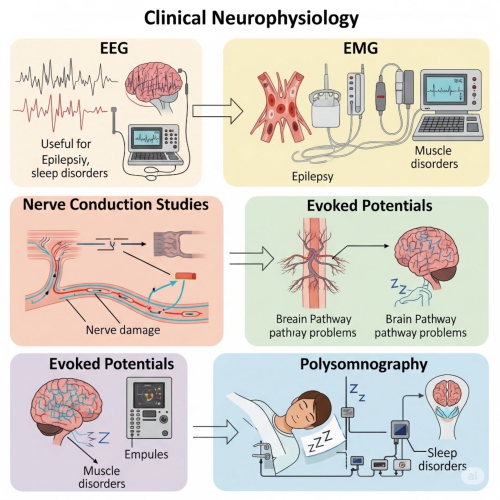Course Details
West African College of Clinical Physiology Sciences (WACCPS)
Duration: 12 Months
Target Audience: Graduates of Human Physiology and other recognized related disciplines
1. Programme Overview
1.1 Program Title:
Professional Certification in Clinical Neurophysiology
1.2. Progamme Objectives:
- To provide specialized training in the principles and practice of clinical neurophysiology.
- To develop expertise in neurodiagnostic techniques, including EEG, EMG, NCS, and evoked potentials.
- To promote research and evidence-based practice in neurophysiology.
1.3. Expected Learning Outcomes:
By the end of the programme, graduates will be able to:
- Perform and interpret electroencephalography (EEG), electromyography (EMG), nerve conduction studies (NCS), and evoked potentials (EP), etc.
- Diagnose and monitor neurological disorders such as epilepsy, neuromuscular diseases, and peripheral neuropathies.
- Operate and maintain neurophysiological equipment
- Conduct research in clinical neurophysiology.
2. Programme Structure:
The 12-month programme consists of:
- - 8 months of didactic lectures, practical sessions, and clinical rotations
- - 4 months of research and oral defense
2.1. Course Modules
Module 1: Basic Neurosciences (2 Months)
- Neuroanatomy and neurophysiology
- Cellular and molecular neuroscience
- Neurotransmitters and synaptic transmission
- Pathophysiology of neurological disorders
Module 2: Clinical Neurophysiology Techniques (3 Months)
- Electroencephalography (EEG):
- Normal and abnormal EEG patterns
- Epilepsy monitoring and ICU EEG
- Neonatal and pediatric EEG
- Electromyography (EMG) & Nerve Conduction Studies (NCS):
- Motor and sensory nerve conduction
- Needle EMG for myopathies and neuropathies
- Neuromuscular junction disorders
- Evoked Potentials (EP):
- Visual (VEP), Auditory (BAEP), Somatosensory (SSEP)
- Intraoperative monitoring
Module 3: Clinical Applications (3 Months)
- Epilepsy and seizure disorders
- Peripheral neuropathies (diabetic, inflammatory, compressive)
- Myopathies and motor neuron diseases (ALS, myasthenia gravis)
- Autonomic nervous system testing
- Sleep studies and polysomnography basics
Module 4: Research & Dissertation (4 Months)
- Research methodology in neurophysiology
- Data collection and statistical analysis
- Writing and defense
3. Teaching and Assessment Methods
3.1. Teaching Methods:
- Lectures, seminars, and case discussions
- Hands-on training with EEG, EMG, NCS, and EP equipment
- Clinical rotations in neurology and neurophysiology labs
- Research supervision
3.2. Assessment Methods:
- Written Examinations (MCQs, Short & Long Essays)
- Practical Examinations (EEG/EMG interpretation, electrode placement)
- Clinical Case Presentations
- Research & Oral Defense
4. Entry Requirements
- Bachelor’s degree in Human Physiology, or recognized health related fields
- Registration with a relevant professional body (where applicable)
- Passing an entrance examination/interview
5. Professional Certification
- Successful candidates will be awarded:
- Professional Certification in Clinical Neurophysiology by WACCPS
6. Accreditation and Quality Assurance
>>
The curriculum aligns with International Education Accreditation Council (IEAC)
7. Professional Career Prospects
Graduates can work as:
- Clinical Neurophysiologists in hospitals, clinics and diagnostic centers
- Neurodiagnostic Technologists
- Researchers/Academics in neuroscience and physiology
- Coordinator in Neurology and Rehabilitation Medicine
Conclusion
This curriculum ensures that graduates acquire globally competitive skills in clinical neurophysiology, addressing neurological healthcare needs in West Africa and beyond.
Approved by:
West African College of Clinical Physiology Sciences (WACCPS)
Apply Now
